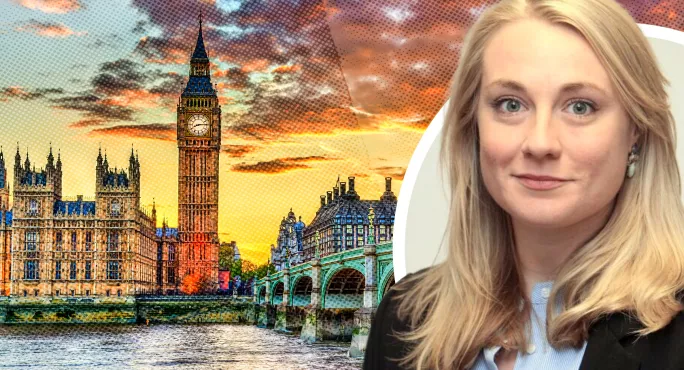
Former No 10 adviser leads campaign against ŌĆśriskyŌĆÖ schools bill

The governmentŌĆÖs education reforms could turn ŌĆ£back the clockŌĆØ by removing academy freedoms, a charity that advocates for free schools is warning.
The New Schools Network (NSN) has appointed a former Department for Education and Downing Street special adviser, Meg Powell-Chandler, as its new director.
Ms Powell-Chandler will use her government experience to advocate for school freedom and innovation, the NSN said.
Over the next few months, the NSN will focus on championing academy freedoms and making the case to revive the free schools programme.
Ms Powell-Chandler was a special adviser for the DfE from 2018 to 2019, and to Downing Street from 2019 to 22 under Boris Johnson. She also ran as a candidate for the Conservative Party in last yearŌĆÖs general election.
NSN campaigns against Labour schools bill
The NSN said the Labour governmentŌĆÖs ChildrenŌĆÖs Wellbeing and Schools Bill threatens to bring an end to the free schools programme and ŌĆ£create new restrictions and bureaucracy for all academy schools, not just new onesŌĆØ.
Ms Powell-Chandler told Tes that the NSN will be focusing on influencing MPs, including those in the Labour Party, as the bill goes through the committee stage.
It also intends to make sure that MPs hear from school leaders who have concerns about the bill, and to highlight that ŌĆ£the legislation as drafted doesnŌĆÖt necessarily line up with what ministers say they want to doŌĆØ.
The NSN plans to argue its case about the bill in the media, and to parents.
ŌĆ£The government is right to focus on raising standards in education, but the proposed legislation risks doing the exact opposite, turning back the clock on one of the most transformative periods of educational reform in recent history,ŌĆØ Ms Powell-Chandler said.
The government is currently reviewing 44 mainstream free school projects to see if they meet a need for places in their area and offer value for money.
In 2022 the NSN lost its bid to continue to provide free school support - instead the three-year contract went to Premier Advisory Group. The NSN is funded from charitable donations.
In 2023 David Ross, chair of trustees at the NSN and the David Ross Education Trust, said free school policy had ŌĆ£lost its wayŌĆØ and become both too slow and bureaucratic.
- New Schools Network: Free schools policy has ŌĆślost its wayŌĆÖ, DfE told
- Free schools: DfE to review 44 mainstream free school projects
- Background: New Schools Network misses out on free-school support contract
The ChildrenŌĆÖs Wellbeing and Schools Bill will bring academies into line with maintained schools in several areas where academies currently have freedoms - such as requiring Qualified Teacher Status and following the national curriculum.
The bill will also allow local authorities to invite proposals for all types of schools to meet the need for new provision. Currently they can only invite proposals for new academies.
Ms Powell-Chandler said this change will mean there will be fewer free schools.
Mr Ross said: ŌĆ£I am not alone as a trust leader in fearing that the current proposals will damage the futures of thousands of children across our country.
ŌĆ£We risk ideologically dismantling the most significant cross-party achievement of the last two decades and taking our education system backwards.ŌĆØ
Some academy trust CEOs had called for changes to the bill to ensure that academies retain their flexibilities and can innovate. Labour has since said it would table an amendment to the bill on pay and conditions in response to concerns raised by the sector.
However, the HeadteachersŌĆÖ Roundtable has voiced support for the bill, saying that while it is ŌĆ£not perfectŌĆØ, it will not ŌĆ£curb so-called academy freedomsŌĆØ.
The NSN was set up in 2009 by Rachel Wolf, a former adviser to Conservative education secretary Michael Gove.
Asked about the role of free schools amid falling pupil rolls, Ms Powell-Chandler told Tes: ŌĆ£Falling rolls are a huge issue.ŌĆØ
ŌĆ£I still think that new ideas and innovations are relevant and there will be parts of the country where there will be a new housing development built or a new focus of a population where a new school is built.
ŌĆ£The fact that the government has changed the presumption of free schools shows that they expect new schools to be built, too.
ŌĆ£It hasnŌĆÖt always just been about the basic need argument,ŌĆØ she added. ŌĆ£ItŌĆÖs about making sure that communities and families have provision that they want and making sure there is a space within the education system for innovation and different ways of thinking to gain access.ŌĆØ
For the latest education news and analysis delivered every weekday morning, sign up for the Tes Daily newsletter
You need a Tes subscription to read this article
Subscribe now to read this article and get other subscriber-only content:
- Unlimited access to all Tes magazine content
- Exclusive subscriber-only stories
- Award-winning email newsletters
- Unlimited access to all Tes magazine content
- Exclusive subscriber-only stories
- Award-winning email newsletters
You need a subscription to read this article
Subscribe now to read this article and get other subscriber-only content, including:
- Unlimited access to all Tes magazine content
- Exclusive subscriber-only stories
- Award-winning email newsletters
- Unlimited access to all Tes magazine content
- Exclusive subscriber-only stories
- Award-winning email newsletters



